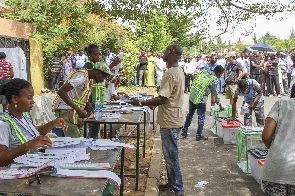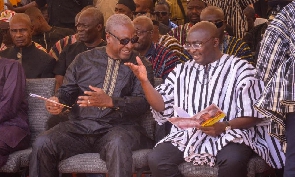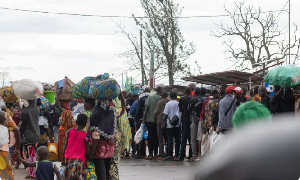Next month voters for Africa most populous kontri, Nigeria, go head to di polls to select dia next president.
Di election dey come as many kontri pipo no dey happy sake of di insecurity and economic hardship.
But di big question many of dem dey ask na if any of di frontrunners, most of dem don dey political system for decades, fit turn di kontri around?
From high inflation to deadly attacks by gunmen against innocent civilians, di seven-year rule of outgoing President Muhammadu Buhari don see Nigerians face various crises.
Him supporters say im don do im best and dem highlight some of im achievements, like im work on infrastructure projects and im attempts to fight violent extremism. But even im own wife, Aisha Buhari, don apologise to Nigerian pipo for falling short of dia expectations.
So whoever go win di election no go get an easy job.
When be di election?
E dey due to take place on Saturday 25 February 2023. If no clear winner, dem go for second round wey go take place within three weeks. Di state govnors elections go also take place on Saturday 11 March.
Di head of di election commission don dismiss suggestions say dem fit move di election sake of insecurity.
Who dey run for president?
A total of 18 candidates dey campaign for di top job, but only three get a realistic chance of winning, according to opinion polls.
Bola Ahmed Tinubu, 70, dey stand for di governing All Progressives Congress (APC) party. Im dey known as a political godfather for south-west region, im get big influence but e dey allegations of corruption ova di years and poor health, both of dem im don deny am. Some say im campaign slogan Emi Lokan, wey mean "na my turn [to be president]" for Yoruba language, dey show a sense of entitlement.
Atiku Abubakar, 76, dey run on behalf of di main opposition People's Democratic Party (PDP). Im don run for presidency five times before - all of which im don lose. Most of im career im don dey corridors of power, e work as a top civil servant, vice-president under Olusegun Obasanjo and a prominent businessman. Just like Oga Tinubu, him dey face accuse of corruption and cronyism, all dis accuse im don deny am.
Peter Obi, 61, dey hope to break up di two-party system wey don dey Nigeria since di end of military rule for 1999 and e dey run for Labour Party. Although im bin dey PDP until last year, im get big support on social media and among Nigeria youth. Obi wey be rich businessman serve as governor of Anambra State for south-east from 2006 to 2014. Im supporters, dey call demself "OBIdients" dem say im be di the only candidate wit integrity, but im critics dey argue say a vote for Obi na waste as im dey unlikely to win.
Who dey likely to win?
History suggests say na candidate from one of di two main parties go win - Oga Atiku or Oga Tinubu. But Oga Obi supporters dey hop say if fit spring a surprise if dem fit mobilise di large youth vote to back am.
How di election dey work?
In order to win, a candidate gatz get di highest number of votes nationwide, and more than a quarter of ballots cast in at least two-thirds of di states for Nigeria.
If none of the candidates manage dis, den dem go go second round, or a run-off, within 21 days between di top two candidates.
Wetin be di main issues?
Reducing insecurity na one of the key concerns for voters, di kontri dey currently experience a kidnapping-for-ransom crisis and also dey battle wit militant Islamist insurgency for some parts of di north.
Two of di most shocking cases last year na di mass shooting for one Catholic Church for Owo and di gunmen attack of a passenger train wia dozens of pipo die or dem bin kidnap dem.
President Buhari say im don fulfil im promise to "frontally and courageously tackle terrorism", but many Nigerians feel say di kontri no dey safe.
Di economy na another area of concern. For 2022 inflation rise for 10 months straight, e just drop to 21.3% according to di latest figures wey dem release dis month. Di rising cost of living don leave many families to struggle to make ends meet, with local media describing di situation as "dire".
Unemployment also na major problem, di mata don make many graduates to fearful say dem no find work even afta years of university study. Latest figures from di kontri National Bureau of Statistics show say 33% of di population dey unemployed - e jump to 42.5% for younger adults.
Despite being a major oil producer, four out of 10 Nigerians dey live below di poverty line and "lack education and access to basic infrastructure, like electricity, safe drinking water, and improved sanitation," according to World Bank.
Many of di candidates don put these issues at di centre of dia campaigns.
But these problems don dey mounting for several years, leaving some Nigerians sceptical about whether whoever wins the election go actually to fix them. Despite di large number of registered voters - 93.5 million - concerns about apathy and how many pipo go actually show up on di day to cast dia ballot.
Wit almost 40% of registered voters under 34, dem dey call dis election di "election of young pipo" na chief Mahmood Yakubu, Inec ogat tok dis.
Will di vote be free and fair?
For previous elections for Nigeria, reports of politicians rigging di elections dey na tori wey dei always come out, either causing violence to scare away voters or snatching ballot boxes and stuffing dem.
But di Independent National Electoral Commission (Inec) say di use of new technology go help ensure say di ballot dey secure and e no dey marred by fraud or rigging.
Anoda tin wey politicians dey do na paying poor voters to support dem, even for polling stations.
But recent change of di naira notes don force cash to scarce dis go make vote-buying difficult, and security agents also go arrest suspects wey dey either give or receive money.
Inec also say e dey illegal for voters to take phones inside polling booths and take pictures of dia ballot papers, as dis proof na wetin votr buyers dey always demand for.
Dem don attack some Inec offices ahead of di vote. Last November di election body bin hold emergency meeting ova di attacks on dia buildings, wey local media described as a "disturbing trend".
TIMELINE OF ATTACKS ON INEC OFFICES BETWEEN 2019 AND 12TH DECEMBER 2022
— INEC Nigeria (@inecnigeria) December 16, 2022
These are attacks as a result of election-related violence, protests unrelated to elections and activities of thugs and unknown gunmen.
The list does not include damages to facilities as a result of fire pic.twitter.com/tyS0x98E6K
Anoda complain wey dey ground na about suspicious voter registration. Last year digital sleuths uncovered voter cards on the digital electoral register wey appear to get pictures of children on them. Di legal age to vote for Nigeria na 18.
Some odas for di preliminary list dey like dem register more than once, Dem do so by changing dia facial expression, clothes or di way dem sit.
At di time of di discoveries, Inec say dem dey open to help of Nigerians to clean up di register.
On 11 January, Inec release a new register, wia e say dem don remove 53,264 ineligible voters. E also say underage voters and vote buyers go face di law.
What oda elections dey take place?
As well as di presidential vote, di public go also choose dia representatives for parliament - di National Assembly.
Na total of 469 legislators wey dey made up of 109 Senators and 360 members of House of Representatives.
Two weeks later on March 11 anoda election go take place dis time na to choose governors for 28 out of Nigeria 36 states.
Wetin you need to vote?
In order to vote, you need to get a valid Permanent Voter Card (PVC), wey go show say you register to vote and prove di identity.
Di PVC contain biometrical data of di voter, wey di voter go use use as further verification on election day. Di data dey stored for card.
But di deadline for, collection of PVC na 29 January.
To cast your ballot, you need to arrive for your polling station between di hours of 08:00 and 14:00 with your PVC. As long as you dey queue to vote by 14:00, you go dey allowed to cast your ballot, Inec tok.
Nigerians wey dey live for abroad no dey allowed to vote.
Wetin be BVAS?
Dis election dey different to previous ones because of di new system wey dem go use - Di Bimodal Voter Accreditation System (BVAS), na device wey Inec introduce for 2021 to stop election fraud.
Di BVAS na small rectangular box wey get screen wey technologically dey more advanced pass di Smart Card Readers wey dem use before.
Di key benefit of di BVAS na say e get di capacity to perform dual identification of voters on election day through dia fingerprints and facial recognition. E go stop pipo without valid PVC from voting, as well as those wey no qualify to vote to attempt to do so.
Another aspect of di BVAS na say e dey upload vote results directly to di Inec results viewing portal for everybody to see, wey means say results no go fit dey tampered wit.
Although pipo still get dia concerns about BVAS afta e experience glitches for state-wide elections for 2021 and 2022, but Inec insists dem don resolve di problems.
When di results go ready?
In the last two presidential elections kontri know di winner afta di third day afta voting.
But votes go dey counted as soon as voting end on Saturday 25 February. Those who stay behind for dia polling station di result go dey announced to them, but na long process before all the results work dia way up to Abuja from di tens of thousands of polling units across di kontri.
BVAS fit speed up di process dis year, but Inec-appointed officials go still need to travel to Abuja from di 36 states wit hard copies so dem fit read am out loud.
Na afta dat Inec chairman go announce a winner - or if dem go need do second round.
Additional reporting by Nduka Orjinmo for Abuja
















